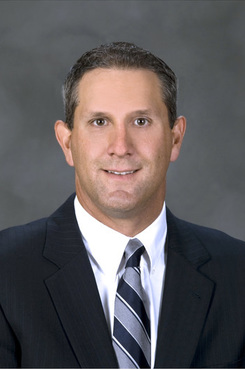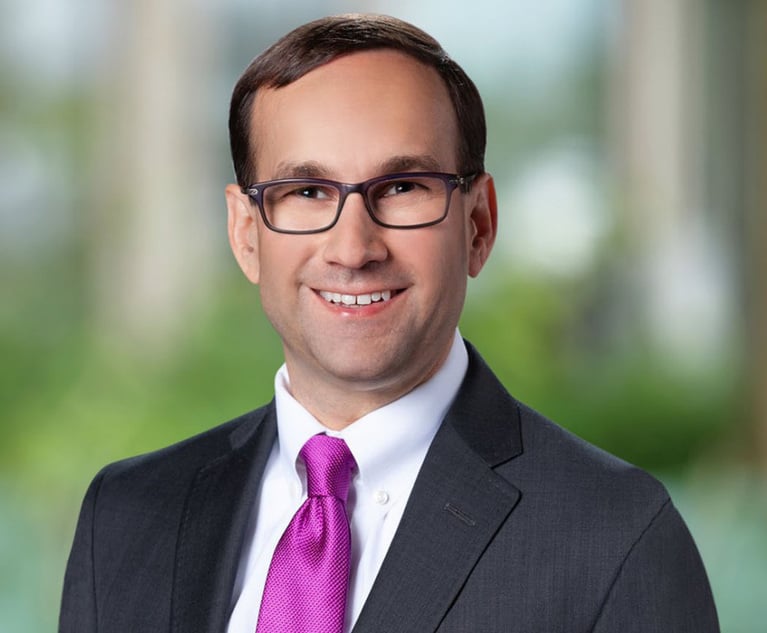FCPA Expert Explores What's New in Strategies, Enforcement
Mike Koehler, author of the FCPA Professor law blog, thinks some things need to change in the FCPA arena.
October 30, 2018 at 04:05 PM
5 minute read
 Mike Koehler
Mike Koehler
Corporate compliance officers and general counsel should focus their attention on enforcement actions that take the U.S. Foreign Corrupt Practices Act in new directions, said Mike Koehler, author of the FCPA Professor law blog.
In a recent interview with Corporate Counsel, Koehler talked about changing case law and enforcement theories related to the FCPA, as well as his new book, “Strategies for Minimizing Risk Under the Foreign Corrupt Practices Act and Related Laws.”
A former senior counsel at Foley & Lardner in Milwaukee, Koehler is now an associate professor at the Southern Illinois University School of Law. He also previously taught business law at Butler University.
Here are excerpts from his interview, which has been edited for style, length and clarity:
CC: Why did you feel the need to write a new book? What has really changed about the FCPA since your 2014 effort, “The Foreign Corrupt Practices Act in A New Era”?
MK: Nothing has changed in terms of the actual statute. However, in many enforcement actions the U.S. Securities and Exchange Commission advances a theory of prosecution—that issuers have an obligation to prevent and detect improper payments—that is not even in the statute.
And there have been several developments in terms of FCPA case law, ever-expansive SEC and [U.S. Department of Justice] enforcement theories, new inventions in terms of resolution vehicles such as declinations with disgorgement, new DOJ policy and ever-expanding enforcement agency compliance expectations around the world.
Are there new FCPA trends, risks or management strategies that weren't there four or five years ago?
Those tasked with compliance within a business organization should focus not so much on the large instances of corporate bribery because in some of these cases the simplistic “just don't bribe” narrative is actually spot-on. Rather, compliance professionals should focus on enforcement actions that seemingly take the statute in a new direction and involve unique interpretations of laws that are not subjected to judicial scrutiny. The recent internship and hiring practice actions are notable, as are the continued stream of corporate hospitality, travel and entertainment actions.
The underlying conduct in these actions is often “normal,” but what makes it objectionable to the enforcement agencies is the identity of the person it is directed to, that is, an alleged foreign official. From a risk management standpoint, this means that compliance needs to be a team sport and that various individuals within a business organization need “FCPA goggles” to spot risk unique to their job function. The book utilizes this approach through various issue-spotting scenarios and skills exercises.
You have often written about the “revolving door” that allows FCPA prosecutors to move into multimillion-dollar partnerships in private law firms. What's wrong with this happening, and how would you remedy it if you could?
Imagine a foreign country where enforcement of a specific law is vested in the hands of a few individuals and where these few individuals investigate, prosecute and resolve all cases. And they enforce the law against business organizations largely behind closed doors. When these individuals leave government service, they often take lucrative jobs providing defense and compliance services to business organizations that are subject to the enforcement climate the individuals helped create and champion. Would you have concerns with such a system?
That pretty much describes modern FCPA enforcement. The FCPA is a fundamentally sound statute that is not always enforced in fundamentally sound ways. There is much cynicism regarding various FCPA enforcement issues, and in my contact with FCPA professionals this is a top concern I frequently hear.
Since 2011, I have suggested a prohibition on government enforcement attorneys who hold supervisory and discretionary authority from providing FCPA defense or compliance services for five years after leaving government service. I believe the legitimacy and credibility of the government's FCPA enforcement program hinge on this policy proposal being adopted.
Please talk about the concept of a “compliance defense” and why you think the U.S. should adopt the idea.
The DOJ and SEC have long recognized that no compliance program can prevent all improper conduct. The enforcement agencies take the position that pre-existing compliance is relevant to their internal deliberations and conclusions, but allowing a compliance defense would elevate this issue to an actual statutory amendment.
Many other OECD Convention [Organisation for Economic Co-operation and Development] countries have compliance defense concepts embedded in their anti-bribery laws. And many former high-ranking DOJ and SEC officials support an FCPA compliance defense. However, the DOJ and SEC oppose such a defense presumably because it would take away their leverage in hard enforcement actions.
But the main value of a compliance defense is to best motivate soft FCPA enforcement. Let's face it, compliance is a cost center within business organizations, and expenditure of finite resources on FCPA compliance is an investment best sold if it can reduce legal exposure, not merely lessen its impact.
Current government incentives represent mere “baby carrots” when what is needed to better incentivize more robust FCPA compliance are real carrots. An FCPA compliance defense is a real carrot that would better incentivize compliance across the business landscape.
This content has been archived. It is available through our partners, LexisNexis® and Bloomberg Law.
To view this content, please continue to their sites.
Not a Lexis Subscriber?
Subscribe Now
Not a Bloomberg Law Subscriber?
Subscribe Now
NOT FOR REPRINT
© 2025 ALM Global, LLC, All Rights Reserved. Request academic re-use from www.copyright.com. All other uses, submit a request to [email protected]. For more information visit Asset & Logo Licensing.
You Might Like
View All
From Reluctant Lawyer to Legal Trailblazer: Agiloft's GC on Redefining In-House Counsel With Innovation and Tech
7 minute read
People and Purpose: AbbVie's GC on Leading With Impact and Inspiring Change
7 minute read
From Olympic Aspirations to Legal Innovation: Tom Dunlop's Journey to Founding Summize
8 minute read
'Am I Spending Time in the Right Place?' SPX Technologies CLO Cherée Johnson on Living and Leading With Intent
9 minute readTrending Stories
- 1States Accuse Trump of Thwarting Court's Funding Restoration Order
- 2Microsoft Becomes Latest Tech Company to Face Claims of Stealing Marketing Commissions From Influencers
- 3Coral Gables Attorney Busted for Stalking Lawyer
- 4Trump's DOJ Delays Releasing Jan. 6 FBI Agents List Under Consent Order
- 5Securities Report Says That 2024 Settlements Passed a Total of $5.2B
Who Got The Work
J. Brugh Lower of Gibbons has entered an appearance for industrial equipment supplier Devco Corporation in a pending trademark infringement lawsuit. The suit, accusing the defendant of selling knock-off Graco products, was filed Dec. 18 in New Jersey District Court by Rivkin Radler on behalf of Graco Inc. and Graco Minnesota. The case, assigned to U.S. District Judge Zahid N. Quraishi, is 3:24-cv-11294, Graco Inc. et al v. Devco Corporation.
Who Got The Work
Rebecca Maller-Stein and Kent A. Yalowitz of Arnold & Porter Kaye Scholer have entered their appearances for Hanaco Venture Capital and its executives, Lior Prosor and David Frankel, in a pending securities lawsuit. The action, filed on Dec. 24 in New York Southern District Court by Zell, Aron & Co. on behalf of Goldeneye Advisors, accuses the defendants of negligently and fraudulently managing the plaintiff's $1 million investment. The case, assigned to U.S. District Judge Vernon S. Broderick, is 1:24-cv-09918, Goldeneye Advisors, LLC v. Hanaco Venture Capital, Ltd. et al.
Who Got The Work
Attorneys from A&O Shearman has stepped in as defense counsel for Toronto-Dominion Bank and other defendants in a pending securities class action. The suit, filed Dec. 11 in New York Southern District Court by Bleichmar Fonti & Auld, accuses the defendants of concealing the bank's 'pervasive' deficiencies in regards to its compliance with the Bank Secrecy Act and the quality of its anti-money laundering controls. The case, assigned to U.S. District Judge Arun Subramanian, is 1:24-cv-09445, Gonzalez v. The Toronto-Dominion Bank et al.
Who Got The Work
Crown Castle International, a Pennsylvania company providing shared communications infrastructure, has turned to Luke D. Wolf of Gordon Rees Scully Mansukhani to fend off a pending breach-of-contract lawsuit. The court action, filed Nov. 25 in Michigan Eastern District Court by Hooper Hathaway PC on behalf of The Town Residences LLC, accuses Crown Castle of failing to transfer approximately $30,000 in utility payments from T-Mobile in breach of a roof-top lease and assignment agreement. The case, assigned to U.S. District Judge Susan K. Declercq, is 2:24-cv-13131, The Town Residences LLC v. T-Mobile US, Inc. et al.
Who Got The Work
Wilfred P. Coronato and Daniel M. Schwartz of McCarter & English have stepped in as defense counsel to Electrolux Home Products Inc. in a pending product liability lawsuit. The court action, filed Nov. 26 in New York Eastern District Court by Poulos Lopiccolo PC and Nagel Rice LLP on behalf of David Stern, alleges that the defendant's refrigerators’ drawers and shelving repeatedly break and fall apart within months after purchase. The case, assigned to U.S. District Judge Joan M. Azrack, is 2:24-cv-08204, Stern v. Electrolux Home Products, Inc.
Featured Firms
Law Offices of Gary Martin Hays & Associates, P.C.
(470) 294-1674
Law Offices of Mark E. Salomone
(857) 444-6468
Smith & Hassler
(713) 739-1250






